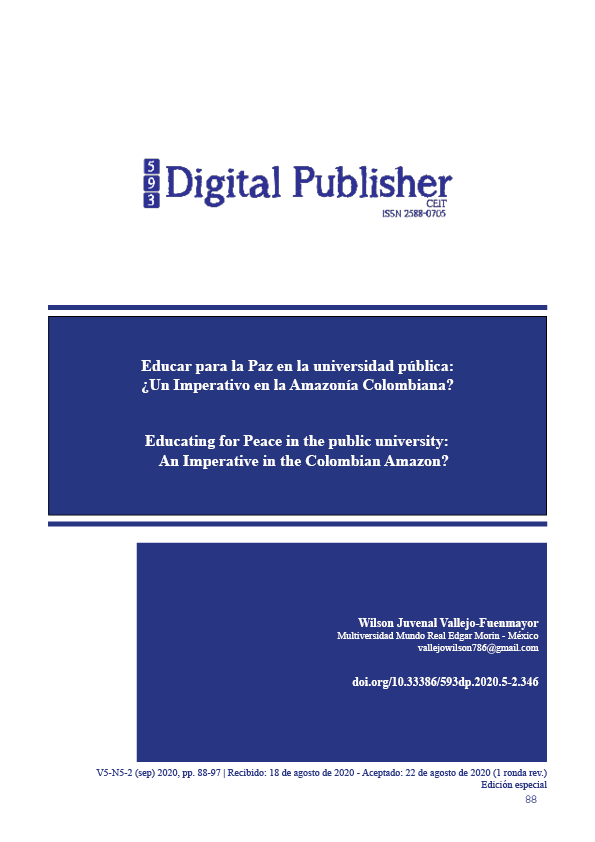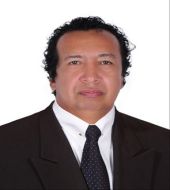Educating for Peace in the public university: An Imperative in the Colombian Amazon?
Main Article Content
Abstract
Between lights and shadows, fears and hopes, Colombia is walking in the process of implementing peace, therefore, the public university in the Amazon must stand up for the work of monitoring and accompanying the indigenous, Afro-descendant and peasant communities in defense of compliance with the agreements signed in 2016.
In the post-conflict period, the university should be thought of as a “university for peace”, projected in its social function, as an agent of peace, fostering access with equity, promoting relevant academic offerings, expanding coverage, training competent and socially responsible professionals and contributing to the elaboration and resignification of the nation project starting from the recognition of who we are from the Amazonian territory.
May the revolutionary spirit of the students of Córdoba illuminate the conquest of the right to stable and lasting peace for the Colombian Amazon, led by the Public University.
Downloads
Article Details
1. Derechos de autor
Las obras que se publican en 593 Digital Publisher CEIT están sujetas a los siguientes términos:
1.1. 593 Digital Publisher CEIT, conserva los derechos patrimoniales (copyright) de las obras publicadas, favorece y permite la reutilización de las mismas bajo la licencia Licencia Creative Commons 4.0 de Reconocimiento-NoComercial-CompartirIgual 4.0, por lo cual se pueden copiar, usar, difundir, transmitir y exponer públicamente, siempre que:
1.1.a. Se cite la autoría y fuente original de su publicación (revista, editorial, URL).
1.1.b. No se usen para fines comerciales u onerosos.
1.1.c. Se mencione la existencia y especificaciones de esta licencia de uso.
References
Armengol Fisas, V (1998). Cultura de paz y gestión de conflictos. ICARIA/UNESCO, Barcelona.
Byung-Chul Han (2013). Topología de la violencia: Titivillus https://www.lectulandia.co/
Casement, R (2011) Libro Azul Británico Informes y otras cartas sobre las atrocidades en el Putumayo (Presentado a ambas Cámaras del Parlamento por orden de Su Majestad, Julio 1912) Traducción al español: Luisa Elvira Belaunde Editorial: IWGIA-CAAAP. Lima.
De Sousa Santos B. (2019) Educación para otro mundo posible. CLACSO Ediciones. Buenos Aires
De Sousa Santos, B. (2010). Descolonizar el Saber, Reinventar el Poder. Trilce. Montevideo.
De Sousa Santos, B. (2009). Una Epistemología del Sur. CLACSO. México
De Sousa Santos, B. (2007). La universidad en el siglo XXI. Plural Editores. La Paz.
De Roux, F. (2018). La audacia de la paz imperfecta. Editorial Planeta. Bogotá.
Galtung, J. (1997). Educación para la paz. UNESCO. Paris.
Gamboa S. (2014). La guerra y la paz. Penguin Random House. Editorial S.A. Bogotá.
Lederach, J. P. (2008). La imaginación moral. El arte y el alma de construir la paz. Grupo Editorial Norma. Bogotá
Machado, A. (1912). “Proverbios y Cantares - de ‘Campos de Castilla’”. Madrid España
Morin, E. (1999). Los Siete Saberes para la Educación del Futuro. París. editado por UNESCO. París.
Multiversidad Mundo Real. (2018) Congreso de todos los saberes. Manizales
Ospina, W. (2016). De la Habana a la paz. Penguin Random House. Editorial S.A. Bogotá.
República, (2016). Acuerdo Final para la Terminación del Conflicto y la Construcción de una Paz Estable y Duradera. Bogotá.


